Jul 2022 1st Edition
Jul 2022 1st Edition Estelle Greeff
English PDF version
Translations
Afrikaans
isiNdebele
isiXhosa
isiZulu
Sepedi
Sesotho
Setswana
Siswati
Tshivenda
Xitsonga
A vision for safety becomes a reality
A vision for safety becomes a reality ReneilweIn 2002, Linah Segoka saw a need for a haven for the children of Madeira village in Limpopo, where she lived. She mobilised the residents and with teamwork, the doors of Lafata Drop-in Centre were soon opened.
 Busi Sambo, a vulnerable children specialist with the Department of Social Development (DSD), says the non-residential, community-based facility provides basic services aimed at meeting the emotional, physical and social development needs of vulnerable children.
Busi Sambo, a vulnerable children specialist with the Department of Social Development (DSD), says the non-residential, community-based facility provides basic services aimed at meeting the emotional, physical and social development needs of vulnerable children.
“Drop-in centres are used as access points for community-based prevention and early intervention programmes,” she says.
The services provided promote school attendance, ensure the children are clean and provide psychosocial support and a cooked meal for each child.
“We live in a rural area with not many jobs available, so I started this project. A lot of the parents work in the city and I wanted to create a safe place for the children,” says Segoka.
She says they have received assistance from the government to keep the centre running. The Department of Agriculture, Land Reform and Rural Development provided training, which equipped the team with the skills needed to keep chickens and grow vegetables.
The Maruleng Local Municipality cleared land for them to extend their vegetable garden and provided seedlings and ingredients for baking. In addition, they received a R5 000 food voucher from Social Development MEC Nkakareng Rakgoale.
Segoka hopes to get further assistance to renovate the centre, buy children’s books and put in swings and a slide.
Drop-in centres
If you would like to send your children to a drop-in centre, contact your local social worker who will identify the one closest to you.
According to the DSD, there is a need to establish more centres to ensure that these services are accessible to all vulnerable children, including those in underserviced and underprivileged communities.
Sambo says that as of March 2022, South Africa had 1 200 centres, looking after 172 180 children.
The DSD, which is responsible for the registration of drop-in centres, says before children may be accepted, a centre must:
- register with its provincial DSD;
- comply with the Public Finance Management Act, Nonprofit Organisations Act and the Children’s Act;
- have an approved building plan, zoning certificate, electrical certificate, health certificate, fire safety certificate, an operational evacuation plan and a food preparation certificate, among others; and
- comply with the national norms and standards relating to drop-in centres.
To get in touch with the DSD, call 012 312 7479 or visit www.dsd.gov.za.
Addiction through the eyes of a former addict
Addiction through the eyes of a former addict ReneilweDrug addiction is crippling South Africa’s youth and resulting in broken homes but too often, the link between drug addiction and mental health is not discussed.
 People who struggle with mental health issues often use substances to deal with their reality – or vice versa. This is what happened to Thabang Moye (37) from Johannesburg.
People who struggle with mental health issues often use substances to deal with their reality – or vice versa. This is what happened to Thabang Moye (37) from Johannesburg.
He says as a primary school learner, he gave into peer pressure and started smoking dagga and drinking. “By the time I hit high school, I was using hard substances, such as cocaine.”
As his addiction grew, he switched to Kat – a cheaper drug with a similar effect to cocaine – and eventually ended up using ecstasy, acid, crystal meth and the street drug, nyaope, which is ravaging poorer communities across South Africa.
He says life as an addict was inhumane. “My mental health was taking a knock. I would hallucinate, change moods and suffer from severe paranoia. I’ve done so many bad things because of addiction. I had no money and no place to stay and my family would not have me because of my ongoing destructive habit.”
Reaching the end
Moye says by the time he was 30, he wanted to end his life. It was only through his mother’s constant interventions and several stints in rehab that Moye eventually committed to getting help in 2014.
While receiving treatment, Moye learnt what triggered his drug use and was taught to better handle his emotions. “I quit everything – cigarettes, alcohol, drugs, dagga and bad behaviour. It was a gradual process, but I am clean.”
After much work, Moye is now a marketing co-ordinator and has regained his dignity.
Katlego Boshielo, social worker and operations manager at the South African National Council on Alcoholism and Drug Dependence (Sanca) Tshwane, explains that mental illness due to drug use is common. “Co-occurring substance abuse problems and mental health issues are more common than many people realise. Illnesses such as bipolar disorder and manic depression can be associated with chronic drug abuse.”
She says the use of drugs among the country’s youth is widespread and is increasing. “We now see that the age of experimentation is as young as 12.”
Boshielo encourages anyone who is suffering from substance abuse or knows someone who is addicted, to contact their nearest rehab facility.
Sanca’s national office can be reached at 011 892 3829. You can WhatsApp them at 076 535 1701 or visit their website at www.sancanational.info
Adventure tourism entrepreneur flies high
Adventure tourism entrepreneur flies high JoyMthokozisi Mabaso (45) is making his mark in the white-dominated tourism and adventure industry.
 Mabaso is a beneficiary of government’s Operation Vula Fund, which aims to create jobs and grow the economy. The entrepreneur now hopes to see his business generate half a million rand in revenue.
Mabaso is a beneficiary of government’s Operation Vula Fund, which aims to create jobs and grow the economy. The entrepreneur now hopes to see his business generate half a million rand in revenue.
He took advantage of the free-to-use land that was available in his village of Ngodini in Eshowe, KwaZulu-Natal, and in 2016 created an adventure tourism business called Ngodini Bundus.
Ziplining, river tubing and rafting, paintballing, 4x4 track and quad biking and hiking are among the outdoor activities offered.
Reflecting on his journey, Mabaso says he approached his local chief to use 27 hectares of densely forested land.
“I was exposed to this type of business at a young age because quad biking is my hobby. So I identified suitable land in my village and the advantage was that we do not pay for land in rural areas. I got it free of charge from the chief.
“Clearing the land and making the roads was a mission and I needed support to make it a safe and attractive place. My brother, who is in a similar business, assisted me,” he says.
He says one of the challenges he faced was marketing, especially given that he was located in an out-of-the-way rural area. He sought assistance from the Small Enterprise Development Agency (Seda), a subsidiary of the Department of Small Business Development, and was given the skills he needed to put his business on the map.
Business training sessions he took part in through Seda helped him to restructure his business and his revenue grew by 40%, he says.
“We now have camping facilities, team-building exercises and host live music shows. Our annual five-day events attract over 6 000 people, even from neighbouring countries.”
The company has 20 permanent employees and during big events, hires another 300 temporary staff members.
Ngodini Bundus was badly impacted by COVID-19 and more recently, the KwaZulu-Natal flood, which washed away some of its infrastructure. Fortunately, it received a R700 000 boost from the provincial Department of Economic Development, Tourism and Environmental Affairs’ (EDTEA) Operation Vula Fund.
“The fund will assist us to add more attractions,” he says.
To benefit from Operation Vula, businesses must submit completed applications at the EDTEA head office at 270 Jabu Ndlovu Street, Pietermaritzburg, or at any EDTEA district office. Alternatively, apply online via the dedicated online application platform – www.operationvula.gov.za
For more information about Seda, contact 0860 663 7867
Email:info@seda.org.za or visit www.seda.org.za
Candidate engineer helps ensure water for all
Candidate engineer helps ensure water for all JoyYajvin Rajcoomar (27) from Durban, KwaZulu-Natal, is a candidate engineer at the Department of Water and Sanitation (DWS).
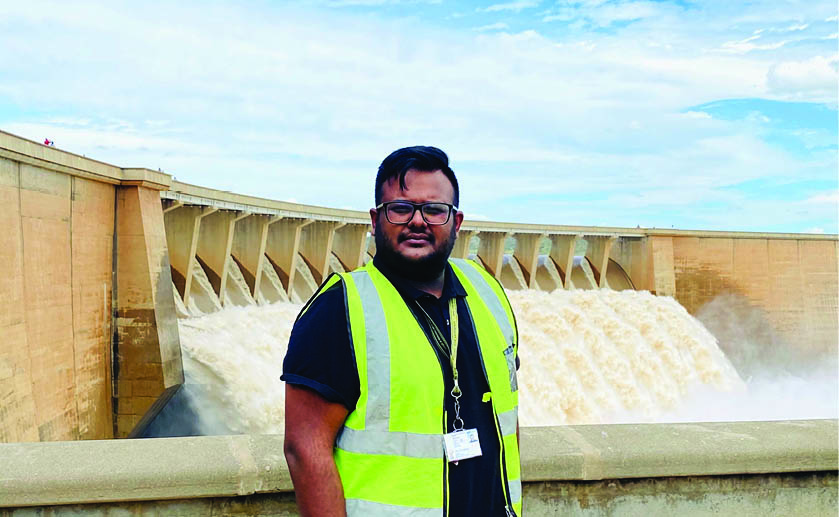 A candidate engineer is a graduate who has to complete and meet requirements set out by the Engineering Council of South Africa to become a registered professional engineer.
A candidate engineer is a graduate who has to complete and meet requirements set out by the Engineering Council of South Africa to become a registered professional engineer.“I graduated three years ago with a degree in civil engineering from the University of KZN (UKZN) and immediately went to work for the DWS on a four-year graduate programme as a candidate engineer,” says Rajcoomar.
The duties of a candidate engineer differ, depending on their field of work. The water-engineering field mainly focuses on the continuous development, maintenance and risk management associated with water infrastructure.
Potential risks include the injury and loss of life due to infrastructure failure, damage to the environment and the overall impact of water infrastructure on the country’s economic growth. Reducing and managing these risks form part of the duties of an engineer.
Rajcoomar was part of the engineering team responsible for assessing infrastructure damage after the recent KwaZulu-Natal floods.
“I was tasked with compiling high-level conditional assessments of damaged infrastructure in district municipalities,” he says.
Rajcoomar’s passion for engineering stems from his curiosity about how things work and operate.
He is currently doing his Master of Engineering, specialising in hydraulic structures, at the University of Witwatersrand. “Earning a master’s degree helps you gain specialised knowledge to obtain a competitive edge in your field. As the workforce evolves, a master’s degree shows dedication to enhancing your expertise and credibility,” says Rajcoomar.
How to become an engineer
If you would like to study civil engineering, you must matriculate with a minimum of 70% in mathematics and physical science. Rajcoomar suggests that you also consider information technology and engineering graphics and design as additional subjects.
As a youth in South Africa, Rajcoomar feels extremely honoured to be part of the DWS because he is able to provide valuable contributions to improving the lives of citizens across the country.
Child support grant misuse is illegal
Child support grant misuse is illegal Reneilwe If you are aware that the child support grant received by a caregiver is being misused, you have the responsibility to report the matter to the South African Social Security Agency (SASSA).
If you are aware that the child support grant received by a caregiver is being misused, you have the responsibility to report the matter to the South African Social Security Agency (SASSA).
According to SASSA Spokesperson Paseka Letsatsi, the child support grant is paid to the caregiver, but is intended for the care of the child. The grant is currently R480 per month per child.
The child support grant was
introduced by government to provide financial support to children who live in poor households.
“As soon as misuse is reported, an investigation is undertaken. If the investigation finds that the money received does not benefit the child, SASSA may appoint someone else to receive and administer the grant on behalf of the child,” says Letsatsi.
He adds that it is critical that the primary caregiver, who actually cares for the child on a day-to-day basis, is the registered beneficiary.
“In an instance where a child moves from one caregiver to another, the grant is supposed to follow the child. The original caregiver is expected to report to SASSA that the child is no longer in his/her care, and the new primary caregiver must then come in to apply for the grant,” adds Letsatsi.
Letsatsi says people who continue to receive child support grants after the children are no longer in their care, will be required to repay the amount received unlawfully. They may also be subject to criminal prosecution if the intention to defraud the state can be confirmed.
The same consequences apply to people who misuse care dependency grants – which are given by SASSA to provide financial support to children with severe disabilities who require full-time care, disability grants or older persons grants.
“If the money is used for alcohol, drugs or gambling, and not for the support of the person who qualifies for the grant, the same process of reporting should be followed,” says Letsatsi.
Who can apply for child support grant?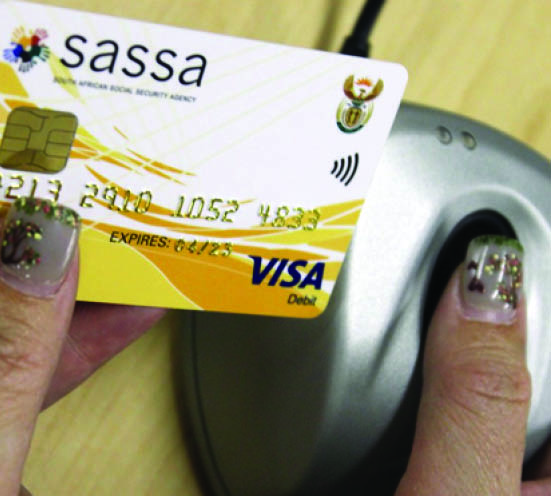
According to Letsatsi, any South African citizen, permanent resident or documented refugee who cares for a child, whether or not that child is his or her biological child, may apply for a child support grant, provided he/she meets the criteria listed below:
• The child and caregiver must live permanently in South Africa.
• The caregiver must be 16 years of age (in the case of child-headed households) or older.
• The child must be younger than 18.
• The grant recipient must be the child’s primary caregiver and the child must live with him/her.
• The recipient must meet the requirements of the means test (income test).
If the primary caregiver is single (never married, divorced or widowed), his/her income cannot be more than R4 800 per month.
If the primary caregiver is married, the combined income of the applicant and his/her spouse cannot be more than R9 600 per month.
The spouse’s income will be considered in all instances – regardless of whether the couple is married in or out of community of property, under customary or Asian rites, are in a civil union or if the applicant and his/her spouse are not the child’s birth parents.
“As soon as misuse is reported, an investigation is undertaken. If the investigation finds that the money received does not benefit the child, SASSA may appoint someone else to receive and administer the grant on behalf of the child.”
To report grant misuse, call SASSA at 0800 60 10 11 (toll-free).
Collect your chronic meds from your local Post Office
Collect your chronic meds from your local Post Office ReneilweIf you are a patient who receives chronic medication from a government clinic, you can now choose to receive your chronic medication at a nearby post office, instead of collecting it from your clinic.
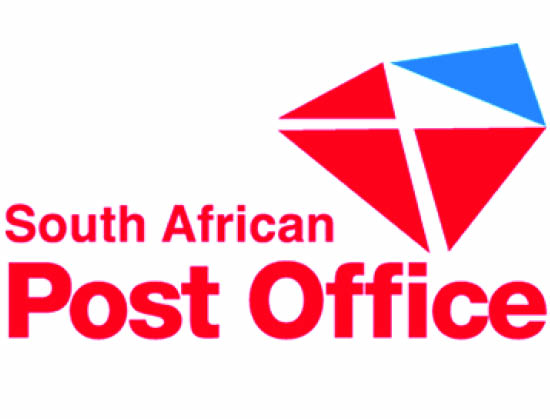 This is according to the South African Post Office Communications Manager Johan Kruger, who says this collection service is available in eight provinces, at 342 post offices. The service is not offered in the Western Cape.
This is according to the South African Post Office Communications Manager Johan Kruger, who says this collection service is available in eight provinces, at 342 post offices. The service is not offered in the Western Cape.
“The service is aimed at patients who live or work closer to one of the post offices than to a government clinic. Post offices are open from 8am until 5pm on weekdays, and operate on Saturday mornings, allowing much longer hours for collecting medication,” says Kruger.
Kruger says queues at post office outlets have reduced since the collection points for the Social Relief of Distress Grants were moved to supermarkets.
Medication can now be collected quickly and with less stress, he says.
Kruger says patients must make arrangements with their clinics to change their collection points.
“Let’s assume you received your medication from Alex clinic, but now you want to collect it from the Alex post office; you need to go to the clinic with your identity document and clinic card and explain to the nurse or health practitioner that from now on, you want to collect your medication from the Alex post office,” he explains.
“The professional at the clinic will make the arrangements and your next round of medication will go to the Alex post office. The patient receives an SMS from the Department of Health when the medication is ready for collection and patients have 14 days to collect it before it is returned to the Department of Health,” he adds.
Kruger says it is important to note that this arrangement can only be done by the clinic personnel on behalf of a patient, not by employees of the South African Post Office.
For enquiries, contact SAPO customer services via email: customer.services@postoffice.co.za or call: 0860 111 502.
Do what you can this Mandela Day
Do what you can this Mandela Day ReneilweWhile international Mandela Day takes place annually on Madiba’s birthday, 18 July, South Africa celebrates this extraordinary icon the entire month.
 In 2009, former President Nelson Mandela called on South Africans to honour him by working in communities rather than celebrating his birthday. This year’s global Nelson Mandela International Day theme echoes his call: ‘Do what you can, with what you have, wherever you are’.
In 2009, former President Nelson Mandela called on South Africans to honour him by working in communities rather than celebrating his birthday. This year’s global Nelson Mandela International Day theme echoes his call: ‘Do what you can, with what you have, wherever you are’.
The call to action is as broad and as inclusive as possible – identify those in need around you and do what you can to make a difference for them, says Nelson Mandela Foundation Analyst Sylvia Graham.
This year, the foundation is focussing its Mandela Day work around its food and nutrition programme and promoting community and backyard gardens, supporting fruit and indigenous tree planting, and creating awareness of the intersections between food security and climate change, says Graham.
As a result, the foundation is urging South Africans to:
- Plant and grow fresh, organic and cost-effective produce in or for vulnerable communities.
- Plant and grow trees for the well-being of all, with an emphasis on fruit trees in support of food production for vulnerable communities.
- Invest in sustainable food production platforms to benefit vulnerable communities.
- Embrace home and community planting and growing as a contribution to protecting the environment and addressing the challenge of climate change.
What can you do?
Mandela Day is about changing the world for the better, just as Madiba did. Any action, no matter how small, can make a significant difference in someone’s life.
If you don’t yet know how you will celebrate Mandela Day, here are a few tips from the Nelson Mandela Foundation that won’t cost you anything:
- Offer to read stories to children at a children’s home.
- Give blood.
- Offer to mow the lawn or fix up the garden at a nursing home or hospice.
- Become an organ donor.
- Research an issue you’d like to find out more about and share your findings with friends on social media.
- Set up a recycling system for your home.
- Clean up a city park.
- Go on a social media fast for the day and rather get to know people who you wouldn’t ordinarily speak to.
- Offer to fix things at a local school or organisation.
- Volunteer at an animal shelter.
- Pick up groceries or medicine for an elderly person.
- Go for a walk with a senior citizen in your community.
- Teach someone how to use a computer or the internet.
- Tutor someone who needs help learning your mother tongue.
For more information about the Nelson Mandela Foundation, visit www.mandeladay.com
EPWP builds brighter futures
EPWP builds brighter futures JoyThe Expanded Public Works Programme (EPWP), which created over one million work opportunities in the past financial year alone, continues to uplift the youth, the poor and the unemployed.
Managed by the Department of Public Works and Infrastructure (DPWI), the EPWP created 1 016 646 work opportunities in the 2021/22 financial year, of which 415 897 (40.91%) were for the youth.
Mapule Mocwaledi is one of 367 youths being trained as artisans through the EPWP Artisan Development Programme. She is also one of 10 learners who have been placed at the TVA Training Centre in Middleburg, where she is being trained to become a diesel mechanic at SG Coal.
She says she is learning valuable skills and using them to provide for herself and her siblings.
“Life has been hard for us at home, since the passing of our parents. The EPWP has been my lifeline, as I am able to use the wages I receive from the programme to put food on the table,” says Mocwaledi.
“The diesel mechanic skills I’m learning also gave me the opportunity to open a small business, and I am earning an additional income by fixing people’s cars in my community,” she adds.
The EPWP Artisan Development Programme is funded by the Department of Higher Education and Training, through its National Skills Fund, and the training is implemented by the Agricultural Sector Education and Training Authority.
Persia Maphake is a beneficiary of the National Youth Service (NYS), another EPWP intervention. She has been placed at an artisan development college in Johannesburg and is training as a lift mechanic apprentice.
Maphake says the programme has given her the opportunity to learn, boosted her confidence as a young woman studying a rare trade, and provided her with the opportunity to earn an income.
“It is a wonderful feeling to wake up every morning and come to the centre to learn. I feel part of a society,” she says.
The NYS, a sub-programme of the EPWP Infrastructure Sector, created 9 195 work opportunities for youth in the 2021/22 financial year.
The Deputy Director-General of the EPWP Branch in DPWI, Carmen-Joy Abrahams, says given the high unemployment rate, especially among the youth, municipalities and departments should further expand EPWP sub-programmes to attract young people.
“There is a need to apply innovation and strengthen dialogues to share best practices on youth programmes,” she says.
For more information about the EPWP and its programmes, visit www.epwp.gov.za.
Fire hydrant hero project upskills Tshwane youth
Fire hydrant hero project upskills Tshwane youth JoyMuhle Mkhonto (29) is one of 15 unemployed youth selected to take part in the Tshwane-Hollard Fire Hydrants Initiative, which is training young people to inspect fire hydrants throughout the city to prevent devastating fires and save lives.
This public-private partnership between the City of Tshwane, National Disaster Management Centre (NDMC) and Hollard was launched on 14 June to create employment and skills development opportunities while ensuring that the city’s fire hydrants are kept in working condition. A fire hydrant is a connection 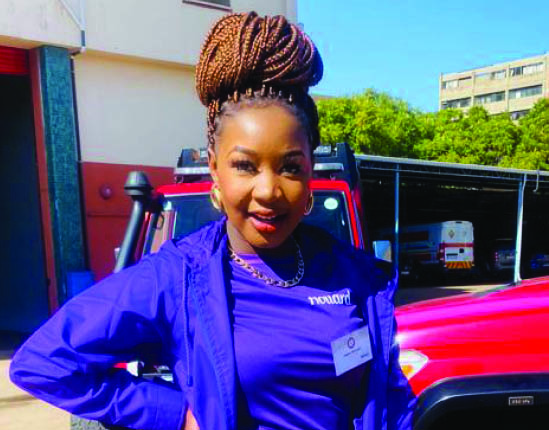 point used by firefighters to tap into a water supply.
point used by firefighters to tap into a water supply.
A number of devastating fires have left South Africans reeling over the past few years, prompting Hollard to initiate a pilot project in the Eastern Cape in 2020, in partnership with the NDMC and the Kouga Local Municipality. In the pilot phase, nine unemployed youth were trained to inspect and maintain fire hydrants – one of the first and most important lines of defence in extinguishing fires before they rage out of control.
Due to the project’s success, it was also launched in Tshwane.
Mkhonto checks that fire hydrants are in working order, logs faults, paints them and makes sure they are visible to emergency services personnel. All data is digitally captured via an app developed for the project.
Mkhonto, from Winternest in Tshwane, was unemployed before she joined the programme. While she started studying project management at the University of Cape Town, she was unable to complete her qualification due to financial challenges. “I had a little side hustle, transporting children to preschool, while hunting for a job.”
She says the initiative has changed her life, as she now has better workplace skills and has undergone level three first aid training.
“COVID-19 resulted in the number of unemployed youth increasing and many people losing their jobs. Some are still struggling. I was one of these unemployed youth, but thanks to Hollard and the City of Tshwane I got the opportunity to learn new skills, serve my community and feed myself and my family,” says Mkhonto.
Hollard Insure CEO Nash Omar says that while inspecting fire hydrants to ensure they are well marked and operational may seem like a small intervention to some, it has a potentially massive ripple effect.
“The initiative is not only lowering the risk of fire damage to Tshwane residents, it is also giving vital skills to unemployed youth. By reducing fire risk, we are protecting lives and property and creating jobs – while saving the insurance industry millions of rands in claims,” he adds.
From banking to farming
From banking to farming JoyA man who changed careers to become a farmer is one of the many people government has assisted to enter the agricultural sector.
While Happy Letsitsa (47) was working in the financial sector, assisting emerging farmers with loans, it became clear that his heart belonged to the land, and he made the brave decision to switch careers.
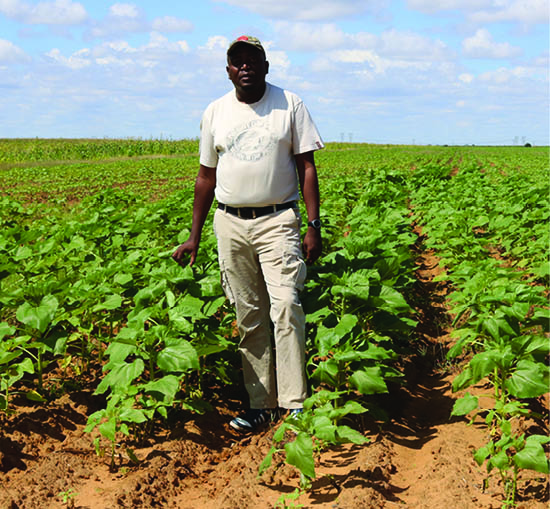 Today, he owns a 423-hectare (ha) farm called Nooitgedacht in the Free State, where he puts all the knowledge he learnt from his father – also a farmer – to good use.
Today, he owns a 423-hectare (ha) farm called Nooitgedacht in the Free State, where he puts all the knowledge he learnt from his father – also a farmer – to good use.
He says 300ha of his land is suitable for growing crops, while the remaining 123ha are used for grazing.
Letsitsa studied agricultural management at the University of Pretoria and received formal training from the Free State Department of Agriculture and Rural Development.
The department also helped enable him to plant 220ha of maize and gave him a 220-kilowatt tractor, which he uses to transport grain to the silo, for chemical spraying and general cleaning work.
Letitsa, who has six permanent and 60 seasonal employees, says he received a financial loan from farmer development company FarmSol, which offers support services to emerging and smallholder farmers.
The backing he has received from government and FarmSol has seen him grow from a developing farmer into a commercial farmer who can offer work experience to agriculture students. The students are part of the department’s exchange programme and were sent to study in Russia, before being placed on farms to gain practical experience.
Letitsa’s plans include purchasing a new planter, a harvester and another tractor.
Help for emerging farmers
Subsistence, smallholder or commercial farmers can apply for training opportunities through the Free State Department of Agriculture and Rural Development.
“We also have the Glen Agriculture College – which is an accredited training institution that offers short courses and diploma certificates in crop and animal production,” says Free State Department of Agriculture and Rural Development Director for Communications Zimasa Mbewu.
To find out more about the opportunities offered by the department, visit their website at www.ard.fs.gov.za or call them at 051 861 8509. You can also visit the national department of agriculture’s website at www.dalrrd.gov.za or call them at 012 319 6000.
GCIS scoops PanSALB Multilingualism Award
GCIS scoops PanSALB Multilingualism Award ReneilweAt a glittering ceremony held in Sandton near Johannesburg on 15 June 2022, the Pan South African Language Board (PanSALB) awarded the Multilingualism Award in the Government/Public Sector category to the Government Communication and Information System (GCIS).
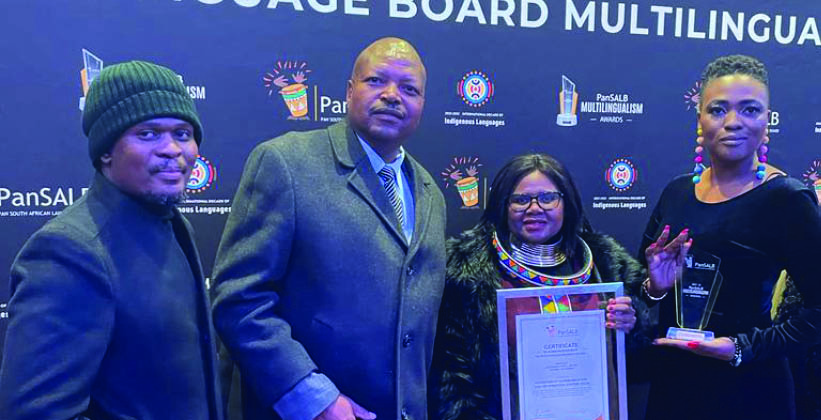 The certificate and trophy were 'for an effective service delivery campaign, project or programme in the public sector that seeks to promote multilingualism or any of the 11 official languages, including Khoi, Nama, San as well as South African Sign Language'.
The certificate and trophy were 'for an effective service delivery campaign, project or programme in the public sector that seeks to promote multilingualism or any of the 11 official languages, including Khoi, Nama, San as well as South African Sign Language'.
Congratulating the language unit team, GCIS Director-General Phumla Williams said: “Thank you for flying the GCIS flag high.”
By virtue of its constitutional mandate to provide the public with information that is timely, accurate and accessible, the GCIS is responsible for providing strategic leadership and coordinating government communications to ensure that the public is informed and has access to government programmes and policies that benefit them.
Section 6 of the Constitution of the Republic of South Africa of 1996 guarantees equal status to 11 official languages – Afrikaans, English, isiNdebele, isiXhosa, isiZulu, Sepedi, Sesotho, Setswana, Siswati, Tshivenḓa and Xitsonga – which enables the former marginalised languages to flourish.
The GCIS has over the past years been consistently producing some of its communication material in all the official languages. In addition to handling various ad hoc communication products, the department’s language unit is also responsible for partially translating articles for the fortnightly Vuk’uzenzele newspaper and the Cabinet Statement. It also harvests, develops and consolidates relevant terminology.
During the national lockdown, the unit was at the forefront of making information on COVID-19 timeously available in all official languages. It also facilitated translations into the two dominant Southern African Development Community languages, Portuguese and French.
Did you know?
The annual PanSALB Multilingualism Awards were established in 2002 to:
- promote and recognise exceptional work in the promotion of all official and other South African languages;
- broadcast the importance of multilingualism in South Africa;
- enhance the use of all official languages;
- raise awareness on the role of languages in general as a uniting agent to the people of South Africa; and
- publicise the role of PanSALB in fostering the climate of equitable language practice.
Government gets small-scale sugarcane farmers moving
Government gets small-scale sugarcane farmers moving JoyNearly 2 000 small-scale sugarcane farmers who could no longer afford to transport their crop by road, are set to boom, thanks to a rail loading facility donated to them by government.
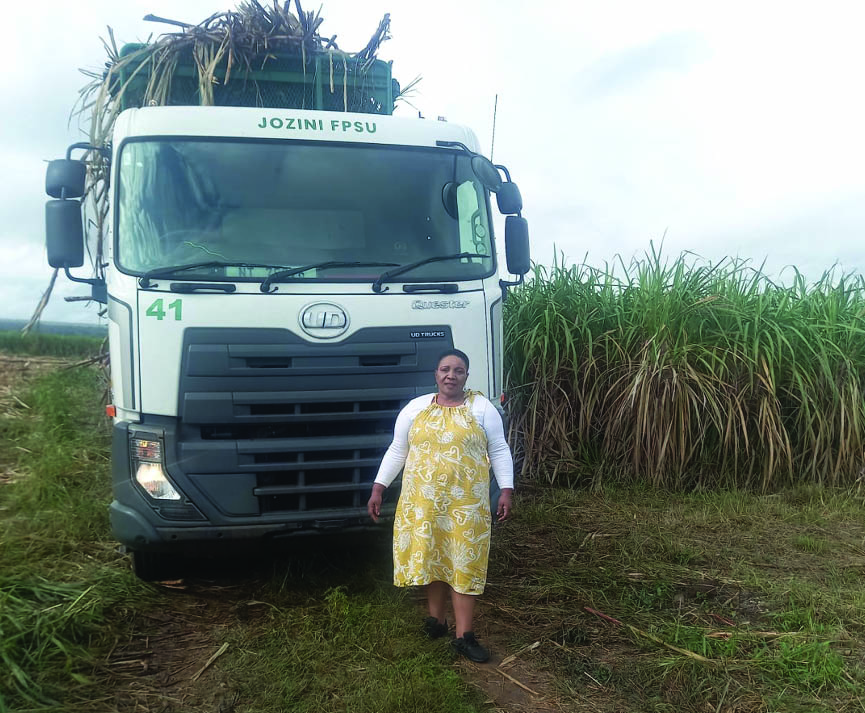 Small-scale sugarcane growers in Umkhanyakude District in the north of KwaZulu-Natal have welcomed the opening of a R38 million rail siding trans-loading facility that will significantly cut their transport costs.
Small-scale sugarcane growers in Umkhanyakude District in the north of KwaZulu-Natal have welcomed the opening of a R38 million rail siding trans-loading facility that will significantly cut their transport costs.
Over 1 900 small-scale sugarcane farmers who are part of the Makhathini irrigation scheme will save R6.8 million per year because they no longer have to use trucks to transport their sugarcane. They produce around 117 000 tons a year.
With the rising cost of fuel, the recent handover by the Minister of Agriculture, Land Reform and Rural Development, Thoko Didiza, could not have come at a better time.
The South African Farmers Development Association (SAFDA) implemented the project on behalf of the Department of Agriculture, Land Reform and Rural Development (DALRRD). It is one of the DALRRD’s initiatives to help to transform the sugar industry.
The project began after Tongaat Hulett Sugar decided it would not be able to continue helping the farmers with their transport costs, says SAFDA Chief Executive Siyabonga Madlala. He says the farmers would not have been able to afford the extra costs, and would have gone out of business. This would have resulted in the collapse of Makhathini’s rural economy, he adds.
Farmers were paying R170 per ton to transport their sugarcane to the Felixton mill – nearly 120km away, with Tongaat Hulett covering the balance of the cost. This will now drop to R112 per ton, says Madlala.
Another benefit of switching to rail to transport the crops is that they will be protected from the sun and rain. Weather damage has in the past caused the farmers to get less money for their sugarcane. The Mkhuze siding machine will help transport three times more per load than the trucks could.
Among others, the siding includes weighbridges, spiller platforms and specialised equipment – some of which was imported, according to Madlala.
During the handover, Minister Didiza said that 25 people have already been hired as controllers, operators, road weighbridge clerks, cleaners, rail tractor operators, security, and site supervisors.
“The infrastructure will reduce production costs while reducing highway congestion by transporting tons of cane through cargo trains. Young people have opportunities,” she said, telling the story of a young man in the control room who studied computer technology, which he can now use in the agricultural industry.
Didiza also handed over heavy-duty machines, farming implements and other products valued at R10 million to growers.
Sugarcane Value Chain Master Plan
The help given to the farmers is in line with the Sugarcane Value Chain Master Plan 2030, which aims to help black people, including women and young people, become owners and play a bigger part in the sugar industry.
Mazwi Simelane, the Chairperson of the Makhathini Farmers’ Association, says the help given will empower many people in the area. The association represents over 2 000 farmers who farm about 7 000 hectares of land. Some farmers lease the land from government through a land reform programme, while others use communal land.
 “This will solve one of the many challenges we are facing. With the rising cost of fuel, farmers were paying a fortune on transportation. This will boost our revenue and we hope the government will continue with other plans,” says Simelane.
“This will solve one of the many challenges we are facing. With the rising cost of fuel, farmers were paying a fortune on transportation. This will boost our revenue and we hope the government will continue with other plans,” says Simelane.
Beatrice Ndimande, the Chairperson of the Thuma Mina Millcane Committee, which represents 600 growers, says they received two horse and trail trucks, tractors and various agricultural machinery.
“The trucks are already on the field, transporting cane to the new railway loading site. Our expenditure has been reduced by big margins. We hope that we will bring more people on board and we will produce more…,” she says.
The Chairperson of the Noodsberg Mill Area Committee, Muziwemali Thusi, says over the years they struggled to produce top-quality cane due to a lack of equipment.
“We could not apply fertiliser or spray weeds, which affected our harvest. With farming supplements, we are optimistic that our products will multiply,” he says.
He says government is looking into the possibility of building a local sugar mill, which will create more jobs.
Farmers who want to be assisted by the DALRRD can visit www.dalrrd.gov.za
Healthy, glowing skin drives entrepreneur’s passion
Healthy, glowing skin drives entrepreneur’s passion JoySearching for a suitable skincare treatment and being unable to find one set Nonceba Hlengani’s (27) journey into entrepreneurship in motion.
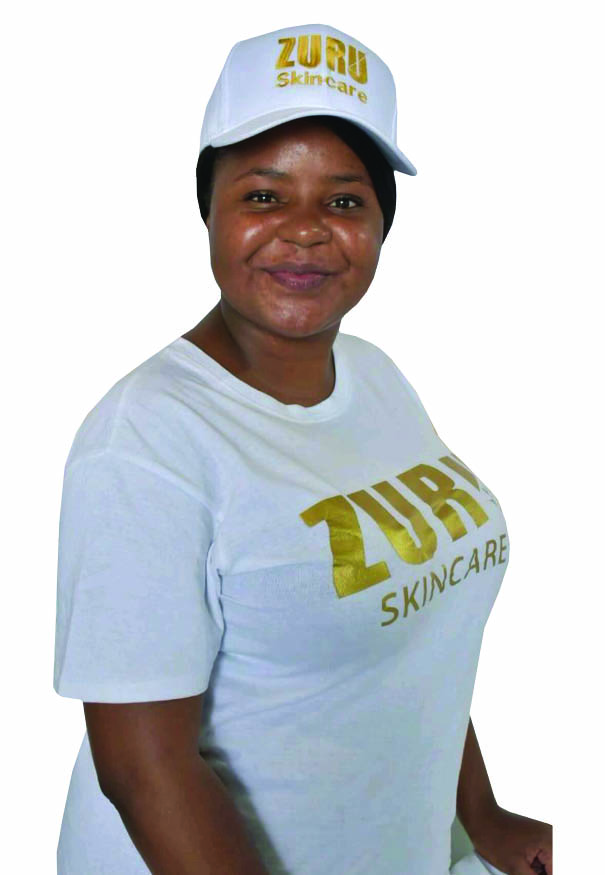 Born in Giyani, Limpopo, and raised in Gauteng, Hlengani’s struggle with her skin during her teenage years impacted her self-esteem.
Born in Giyani, Limpopo, and raised in Gauteng, Hlengani’s struggle with her skin during her teenage years impacted her self-esteem.
“I tried several products from retailers and dermatologists hoping to find the right one but wasn’t successful. My acne and dark spots worsened and I almost gave up hope,” she says.
Instead, the then 24-year-old was determined to find an answer and started doing her own research.
“My family was part of the journey from the beginning. We established Xitsavi Health in 2017 and worked with CW Pharmaceuticals. My father knew its founder Charles Moolman, who had over 20 years’ experience in the pharmaceutical industry,” says Hlengani.
The successful partnership led to the launch of Hlengani’s Zuru Skincare collection, for adults and children, which is manufactured and distributed by Xitsavi Health.
“The adults’ facial range treats dark spots, acne and pigmentation; and the baby range, Zurubaby, caters for children up to five years old. Zurubaby promotes healthy skin and treats dry, sensitive and eczema-prone skin,” Hlengani explains.
She also received assistance from the Gauteng Growth and Development Agency (GGDA) to market her business. The GGDA assisted Hlengani with posters and flyers which is in line with the organisation’s aims of helping businesses to unlock investment and expansion opportunities.
“During the 2020 lockdown, things went quiet and so did some of our customers. We understood that the times were difficult financially, but COVID-19 put our plans to grow and venture out of South Africa on hold.”
Hlengani approached the Gauteng Enterprise Propeller (GEP), which promotes, fosters and develops small enterprises in Gauteng to assist her with COVID-19 Relief Funding.
 Her company was assisted with R12 000 from the GEP.
Her company was assisted with R12 000 from the GEP.
She added that the pandemic came with a lot of valuable lessons around online marketing.
After three years of self-marketing and online advertising, Hlengani’s hard work and determination paid off and she signed a deal with Clicks for Zurubaby. The range is now available in 32 Clicks stores nationwide.
She also added that she would like to see her products being sold in all retailers and boutique outlets throughout South Africa, and aim to make Zuru Skincare a household name in Africa.
For more information about opportunities available from the GEP and GGDA, visit www.gep.co.za and https://ggda.co.za.
Hotel barista brews inspiration for deaf community
Hotel barista brews inspiration for deaf community ReneilwePhumzile Mazibuko (35) from Pietermaritzburg in KwaZulu-Natal didn’t let her disability become a hurdle to realising her dream. Instead, she let it become an inspiration to others.
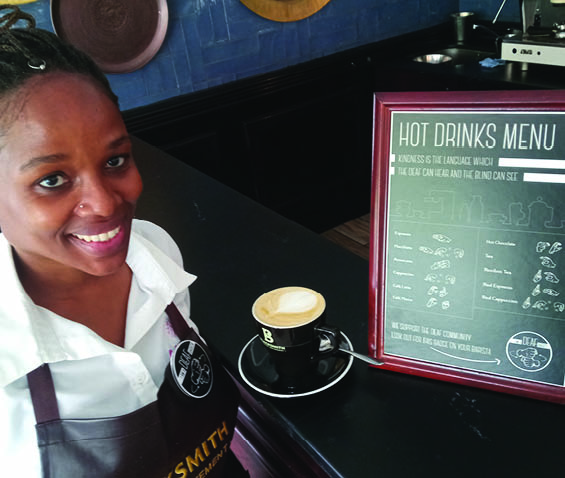 Mazibuko, who was born deaf, is a barista at the ANEW Hilton hotel in Pietermaritzburg. She joined ANEW hotels in 2019 after doing adult education and training courses and a National Certificate in IT through eDeaf, which specialises in training and securing employment services for the deaf community.
Mazibuko, who was born deaf, is a barista at the ANEW Hilton hotel in Pietermaritzburg. She joined ANEW hotels in 2019 after doing adult education and training courses and a National Certificate in IT through eDeaf, which specialises in training and securing employment services for the deaf community.
“I had a bit of experience in wholesale and retail and once I spoke to eDeaf about my ambitions, they connected me with Ciro Training Academy – a coffee academy that trains baristas. I completed my training in three months and was able to secure employment at ANEW,” says Mazibuko.
The mother of two, a daughter and a son who is also deaf, says it is important for South Africans to learn sign language.
She says her colleagues and customers do not see her deafness as a barrier, but instead as a learning opportunity – the coffee bar has even set up a sign language chart so customers can order using sign language.
Hearing the unheard
Nicky Bezuidenhout, Marketing and Communications Manager at eDeaf, explains that even though it might not seem so, there are ample opportunities for deaf people in South Africa.
“Over 80% of deaf South Africans are unemployed, and we seek to change that alarming statistic. There are many government incentives on offer to sponsor learnerships for deaf people and our role is to ensure the integration is smooth and that there is mutual understanding. All our learners undergo work readiness training which is critical to ensure placements are set up for success,” she says.
Bezuidenhout says there are several schools for the deaf in South Africa that offer matric. “eDeaf also offers learnership courses equivalent to a matric,” she says.
The B-BBEE Level 2 business recently launched a non-profit company called DEAFinition, which provides a range of services and funding opportunities to promote equal access for the deaf community.
Contact DEAFinition at 087 063 8920 or email info@deafinition.co.za
KZN fashion designer goes global
KZN fashion designer goes global ReneilweA self-taught fashion designer, Lindiwe Makhoba from Ladysmith in KwaZulu-Natal, is gaining a global footprint for her fashion business.
 When Makhoba (40) started helping women in her community with dress designs, little did she know that she would later venture permanently into the fashion industry. The women she helped realised her talent and inspired her to start her own fashion label, which she called Unalisa, in 2016. The label is known for its elegant yet simple dresses.
When Makhoba (40) started helping women in her community with dress designs, little did she know that she would later venture permanently into the fashion industry. The women she helped realised her talent and inspired her to start her own fashion label, which she called Unalisa, in 2016. The label is known for its elegant yet simple dresses.
The business initially had only local clients and was not growing. Makhoba approached the Small Enterprise Development Agency (SEDA) for assistance. SEDA, an agency of the Department of Small Business Development, provides non-financial business development and support services to SMMEs. Reaching out to SEDA proved to be a turning point for Makhoba.
The agency not only secured her a spot at the Pietermaritzburg Royal Show, but assigned a business advisor to help Unalisa grow, she says.
The Pietermaritzburg show opened many doors, says Makhoba. “I met relevant people and customers liked my fashion taste.”
As a result, after the exhibition, she received an invitation from Trade and Investment KwaZulu-Natal to be part of its export trade programme.
“They were impressed with my work and I was part of six South African designers who attended London Fashion Week in 2019,” she says.
She has also twice taken part in the Seychelles Fashion Week and is currently preparing for the 2022 London Fashion Week in October.
Before COVID-19, Makhoba applied for and received a R90 000 grant from the Small Enterprise Finance Agency (SEFA), which provides development finance to SMMEs and co-operatives. She used the money to buy four additional sewing machines, which allowed her to do machine embroidery and overlocking.
She survived COVID-19 by making masks for businesses.
Unalisa employs two women permanently and uses two temporary workers when there are big orders.
Makhoba says she wants to create opportunities for young designers who find it hard to break into the industry. She says she would like to own a design house and assist them to get established.”
To apply for SEFA funding, visit www.sefa.org.za. Find out more about SEDA by visiting www.seda.org.za
Kusile to boost Eskom this winter
Kusile to boost Eskom this winter ReneilweMORE ELECTRICITY is being generated in South Africa, thanks to three units adding extra power to the national grid. However, Eskom says South Africans must continue to do what they can to reduce their electricity usage.
 Eskom’s efforts to ensure there is enough electricity for everyone in South Africa received a boost after Unit 4 of the Kusile Power Station was officially connected to the power system.
Eskom’s efforts to ensure there is enough electricity for everyone in South Africa received a boost after Unit 4 of the Kusile Power Station was officially connected to the power system.
According to Eskom, the unit has been undergoing tests while occasionally supplying electricity over the past five months.
It is the fourth of six units to be constructed at Kusile Power Station.
“At completion, the station will consist of six units and will produce a maximum 4800MW. Situated near eMalahleni in Mpumalanga, Kusile is South Africa’s largest construction project and will be the world’s fourth largest coal plant at completion,” Eskom says.
Use only what you need
In winter, more electricity is used than in summer because lights are switched on earlier and people use heaters to keep warm. When everyone is home from work, the most electricity is used. These are called peak hours – from 5am to 9am and 5pm to 10pm.
Eskom has appealed to South Africans to switch off all non-essential appliances during these times.
One of the easiest ways to save electricity is through your geyser, which can use up to 50% of a household’s electricity. Set the geyser’s temperature to no more than 60°C and cover older geysers with a geyser blanket.
Tips to reduce energy usage:
- Switch off unnecessary lights and switch off appliances at the plug point as they still use power when they are plugged in, even if they are not being used.
- When making a hot drink, boil only enough water for what you need.
- Use a hot water bottle and extra blanket rather than an electric blanket or heater and only use cold water to wash your hands.
- Use energy efficient light bulbs.
Lindo’s kitchen is back in business after looting
Lindo’s kitchen is back in business after looting ReneilweThe National Empowerment Fund (NEF), in partnership with the Solidarity Fund, has thrown a young entrepreneur a lifeline.
 Lindokuhle Msomi (29) caught the nation’s attention when he used nine months’ worth of savings from his R350 social relief grant to start a roadside fast food outlet in KwaMashu, Durban, in February 2021.
Lindokuhle Msomi (29) caught the nation’s attention when he used nine months’ worth of savings from his R350 social relief grant to start a roadside fast food outlet in KwaMashu, Durban, in February 2021.
Months later, however, his structure – made from recycled wood – his stock and his appliances were looted in the July 2021 unrest that ripped through KwaZulu-Natal.
In May, the smile was put back on his face when he took delivery of a custom-built kitchen, valued at R400 000, through a grant set up by the NEF and Solidarity Fund to support businesses affected by last year’s civil unrest.
Msomi says losing his job as a freelance videographer and photographer when the country went into a hard lockdown in 2020 triggered his entrepreneurial skills. He found the material needed to build a structure for a fast food kiosk, borrowed a stove and deep fryer and used his savings to buy stock.
Msomi inspired the nation with his determination when his story was shared on TV. As a result, the NEF – which provides financial and non-financial support to black-owned and managed businesses – approved funding to help the entrepreneur.
In May, after helping him register with the South African Revenue Service (SARS) and Companies and Intellectual Property Commission, get community approval, municipal permits and access to water and electricity, Msomi received his new kitchen. He also received cooking equipment, stock and training to run his business.
Called Lindo’s Kitchen, the menu has been extended to include burgers, rotis, hot dogs, grilled meat, chips and cooked meals.
“Our client base has increased, which created job opportunities and I have employed four people,” says Msomi.
NEF CEO Philisiwe Mthethwa says as a ‘funder with a soul’, the NEF strives to make a difference every day to the economically marginalised.
Funding for unrest-hit businesses
Mthethwa says applicants’ companies, closed corporations or cooperatives have to be registered and in good standing with SARS. They must also be able to prove that they were negatively impacted by the unrest in KwaZulu-Natal or Gauteng and show that jobs lost would be restored or increased within 12 months of receiving funding.
Applications can be emailed to unrest-relief@nefcorp.co.za. Alternatively, call the NEF at 0861 843 633 (0861 THE NEF).
Minister Zulu champions SheDecides
Minister Zulu champions SheDecides LondekileSocial Development Minister, Lindiwe Zulu, has been appointed as a champion for a global and diverse movement driving change to ensure that every woman, girl and young person has the right to make decisions concerning their bodies, lives and future.
The SheDecides movement brings together government, civil society, media and donors to stand up and to speak out for bodily autonomy, and sexual and reproductive health and rights.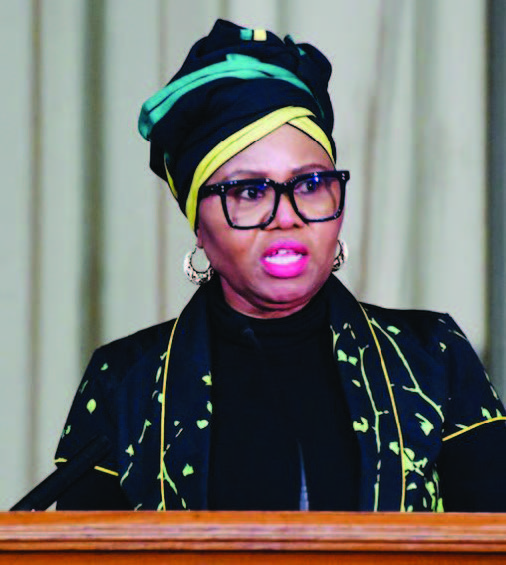
“I welcome the opportunity to join forces with other SheDecides champions across the globe to advance an agenda that promotes and protects girls and women’s right to make their own choices, including exercising the right to gender identity without any fear of violence,” Minister Zulu said.
As a SheDecides champion, Minister Zulu is expected to advocate for political action that advances the fundamental right of girls and women everywhere to enjoy their bodies, to make their own choices, to have access to comprehensive sexuality education. This includes the full range of quality care associated with sexual and reproductive life and health.
Accepting the position, Minister Zulu said she looks forward to working with all other like-minded champions and partners across the globe. She said she stands ready to speak out for policies and programmes that are responsive to women and girls' lived experiences.
Minister accepted the responsibility to be part of the global movement because its strategic focus complements ongoing initiatives by government to address key population and development challenges.
These include the unacceptably high level of teenage pregnancies, gender-based violence and femicide (GBVF), forced child marriages in some parts of South Africa, and hate crimes against members of the LGBTIQ+ (Lesbian, Gay, Bisexual, Trans, Intersex and Queer) communities.
Minister Zulu is currently a member of the High-Level Commission on the Nairobi Summit on International Conference on Population and Development (ICPD). – SAnews.gov.za.
More funding for disaster relief
More funding for disaster relief JoyOver R3.6 million has been donated through a dedicated bank account opened by the KwaZulu-Natal Provincial Government towards the rebuilding process following the floods.
KwaZulu-Natal Premier, Sihle Zikalala, recently said as at 1 June 2022, the donor account had R3 625 960 in total, with R100 000 specifically earmarked for the Department of Health.
 “An amount of R3 million is set aside for education, mainly the fixing of four schools, while R500 000 from the government of Qatar will be allocated to the Department of Social Development.
“An amount of R3 million is set aside for education, mainly the fixing of four schools, while R500 000 from the government of Qatar will be allocated to the Department of Social Development.
“We wish to acknowledge the generous donations we have received from major donors such as the government of the United Arab Emirates, Spirit Ambassadors International Church and Sasol.
Premier Zikalala added that all provincial government departments are reprioritising their budgets in order to aid the funding of the recovery process.
“In aggregate terms, our provincial departments are planning to reprioritise R3.652 billion towards the disaster, with these funds coming mainly from conditional grants under the Departments of Transport and Human Settlements.”
He also said non- infrastructure related funding including support to business is coming from [the Department of Economic Development and Environmental Affairs.
The Premier noted that the grant framework for emergency funding does not allow the release of funding for properties that are insured.
He said while most municipalities have insurance cover, their covers are not sufficient and comprehensive enough for the magnitude of the disaster experienced by the province.
“The implications are that if government applies the existing principles of the grant framework, municipalities will not be able to adequately fix all the damage that has been incurred.”
He added that it is because of this background that government is looking at reviewing laws that are in line with disasters. – SAnews.gov.za
One man’s vision to empower the youth
One man’s vision to empower the youth JoyElectrical engineer Sbusiso Mahlangu(33) is his own boss, thanks to the support he received from the National Youth Development Agency (NYDA).
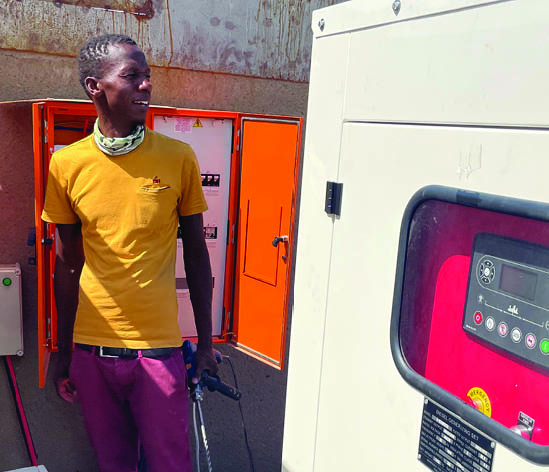 He received grant funding and support to start Mthimunye Consolidated Projects Kwaggafontein ing Mpumalang and does high-, medium- and low-voltage electrical work.
He received grant funding and support to start Mthimunye Consolidated Projects Kwaggafontein ing Mpumalang and does high-, medium- and low-voltage electrical work.
Mahlangu’s team finds and fixes cable faults, installs distribution boards that supply electricity to homes and office buildings, fixes electricity connectors, services electrical machinery and does installations, amongst other things.
When asked where his passion stems from, Mahlangu says he was a curious young boy who loved solving problems and coming up with solutions. “Growing up, my older brother and I were problem solvers. I knew from there I was an innovative person.”
Mahlangu heard about the NYDA on a TV programme and approached his local office for assistance to start his own company.
The response from the NYDA was positive and Mahlangu was enrolled on an entrepreneurship skills programme offered by the NYDA.
He also received assistance to obtain a BBBEE certificate and received nearly R50 000 in grant funding. He used the cash to buy equipment, tools and a laptop for the business.
Although Mthimunye Consolidated Projects was registered in 2014, it did not start operating until 2017 because Mahlangu did not have his electrical trade certificate. He remained focused, however, and worked as a teacher to pay for the courses needed to get his trade certificate.
“I’m not where I want to be, but when I look back at where I was, there’s movement,” he says.
Mahlangu currently has four temporary employees and hopes to grow his business and employ more people.
“I want to motivate the underprivileged and the youth. I would like to employ them and I want to change their situation,” says Mahlangu, who is eager to find innovative solutions through industrial automation.
For more information on the NYDA, visit www.nyda.gov.za or call 087 158 6345 / 5738. Alternatively, you can send an email to info@nyda.gov.za
Report crimes against women and children
Report crimes against women and children JoyMinister in the Presidency for Women, Youth and Persons with Disabilities, Maite Nkoana-Mashabane is calling on South Africans to report criminal behaviour targeted against women and children.
“We must challenge the toxic and violent norms and values that perpetuate the violence in our homes, schools, workplaces and churches. We need collective action to report criminality and intervene as communities in promoting prevention of crimes,” Minister Nkoana-Mashabane said.
The Minister’s comments came after the 4th quarter crime statistics released by Police Minister, Bheki Cele, which painted a horrific picture of the extent of violence against women and children, particularly girls in South Africa.
“Although the current statistics paint a horrific picture of violence in our homes and communities, the unfortunate reality is that there are many who continue to suffer from extreme forms of violence, in silence. Therefore, we are really faced with a shadow pandemic of violence against women and children,” Minister Nkoana-Mashabane said.
The statistics indicated that there is an increase in the number of contact crimes, particularly murders and sexual violence.
Minister Nkoana-Mashabane noted that many researchers, academics, and activists working in the gender-based violence and femicide (GBVF) sector put this figure much higher due to the increasing number of unsolved murder and assault cases still under investigation.
Minister Cele echoed the sentiments expressed by Minister Nkoana-Mashabane on the need to take decisive action by society to respond to the prevalence of violence in communities.
She emphasised that citizens can no longer ignore how high levels of violence remain a threat to the social, cognitive, physical development of the country’s future. – SAnews.gov.za
Report all cases related to GBVF to your local police station or call the toll-free Crime Stop number: 086 00 10111.
If you are a survivor of GBV and need help, you can contact the Gender-Based Violence Command Centre at 0800 428 428. Alternatively, send a ‘please call me’ by dialling *120* 7867#, or SMS ‘help’ to 31531. Members of the deaf community can also contact the centre via Skype: Helpme GBV.
Rising cost of living calls for a united response
Rising cost of living calls for a united response JoyOver the past few months, South African consumers have been hit by steep price increases that have dramatically affected their quality of life.
It has become increasingly more expensive to buy food and other essentials, to pay for basic services and to use public or private transportation. While these rising costs affect everyone, low-income households are feeling them the most.
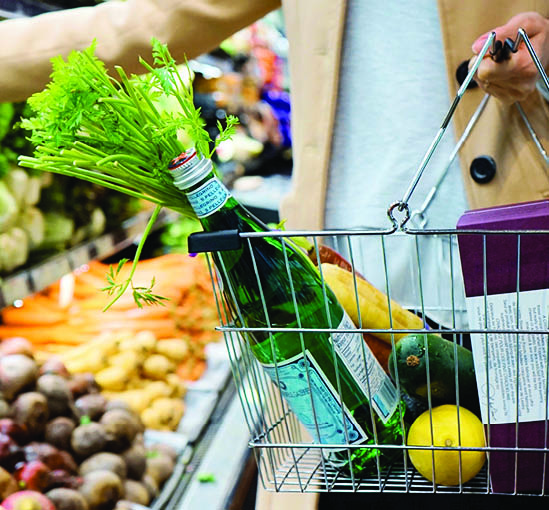 The latest Consumer Price Index for April 2022 published by Stats SA shows there has been little respite for hard-pressed South Africans. Food inflation was recorded at 6.2 per cent. The most basic foodstuffs cost more than a year ago, with staples like cooking oil recording the highest increases.
The latest Consumer Price Index for April 2022 published by Stats SA shows there has been little respite for hard-pressed South Africans. Food inflation was recorded at 6.2 per cent. The most basic foodstuffs cost more than a year ago, with staples like cooking oil recording the highest increases.
The price of fuel, which affects the price of almost everything else, has risen by a third in the twelve months to March 2022.
South Africa is not alone in this regard.
A recently published poll for the World Economic Forum shows that nearly a quarter of people globally, including those in developed economies, are struggling financially due to rising prices.
These increases, particularly the price of fuel, are the consequence of events over which we have little control. The ongoing conflict between Russia and Ukraine has had a significant impact on the price of fuel and food. Both countries are major exporters to international markets of fertilisers, grains and oilseeds that are needed for a range of items such as cooking oil.
Another factor is lower agricultural output due to extreme weather events caused by climate change, such as flooding and droughts.
While many of these events are beyond our control, government is doing what it can to shield the South African from current and future price increases.
One of our greatest advantages as a country is a strong, independent Reserve Bank that has managed to keep inflation within a narrow target range, well below what many other countries are experiencing.
We recently announced that the fuel levy will be suspended for another two months to August, which will bring some relief to households. The suspension of the levy has provided essential relief to South Africans since it began in April. Since the suspension of the levy comes at a significant cost to public finances, which affects other programmes of government, it will be difficult to continue this indefinitely.
There are, however, other things we can do.
Improving our nation’s food security is vital to withstanding this and future shocks. We have a strong agricultural sector that continues to grow and create jobs.
To further increase agricultural production and strengthen our food sovereignty, we are investing heavily in improving local capacity, supporting commercial and small-scale farmers alike and helping more people to grow their own food.
Through the Presidential Employment Stimulus, input vouchers have been given to over 65,000 smallholder farmers, and work is underway to reach 250,000 such farmers. Government is also providing subsistence farmers with fertilisers and equipment to produce food, and helping groups or individuals to start their own food gardens. In provinces like North West, small-scale farmers are supported with agricultural ‘starter-packs’ of seedlings and poultry, in partnership with local agricultural colleges.
Through the Pro-Active Land Acquisition Strategy and the release of state-owned land for agriculture, we are supporting more small-scale farmers to expand their businesses and make them commercially successful. We are also focusing on establishing more public-private partnerships to support the expansion of black commercial farming through initiatives like the Partners in Agri Land Solutions and the Agricultural Development Agency.
To enhance biosecurity and safeguard animal health against diseases like foot-and-mouth, we are strengthening our animal movement control measures and vaccine production capabilities.
In addition to boosting local food production, our extensive social grants system and zero-rating of basic goods helps to protect the poor from rising costs. Through free basic services like water and electricity for indigent households, we can ensure that no family goes without basic services.
To get through this difficult period, all of society should get involved.
For our part, government will continue to monitor the situation closely and will do everything within its power to protect South Africans from unsustainable increases in the cost of living.
Corporate South Africa should ensure that consumers do not pay more for food than they have to. We welcome the indications from food manufacturers and retailers that they are putting measures in place to help consumers get more for their money.
In March this year the Competition Commission released for public comment the terms of reference for a market enquiry into the fresh produce market. It noted that the cost of fresh produce has been increasing at above-inflation levels, and that this has had a disproportionate effect on the poor. The inquiry will examine if there are any distortions in the value chain that make food more expensive.
We will use our competition policy to protect consumers against unjustifiable price increases and anticompetitive practices by businesses, as we did during the COVID-19 pandemic.
The ongoing process of structural reform of our economy will support these efforts. Reforms in the energy, transport and telecommunications sectors aim to reduce the cost of electricity, logistics and data in the long term through greater competition and efficiency. We should be paying less, not more, for these services in the future.
Though oil prices and extreme weather are events over which we have little control, there is still much we can do, as government, business, labour and communities to help the people of South Africa through this difficult time.
WC Treasury bursary programme open
WC Treasury bursary programme open JoyApplications for the 2023 Western Cape Provincial Treasury bursary programme are open.
 The Western Cape Provincial Treasury is committed to addressing critical skills shortages and creating opportunities for young people in various treasury fields, says Mireille Wenger, the Western Cape Minister of Finance and Economic Opportunities.
The Western Cape Provincial Treasury is committed to addressing critical skills shortages and creating opportunities for young people in various treasury fields, says Mireille Wenger, the Western Cape Minister of Finance and Economic Opportunities.
“I am ‘on the job for jobs’ and my overarching objective is to create the right conditions for economic growth and therefore, job creation. Skills development, especially for our youth, is a critical factor in making this happen,” she adds.
Youth aged between 17 and 35, including Grade 12 learners and post- and undergraduate students can apply for the bursary programme.
If you are interested in a career in economics; finance; accounting and auditing; supply chain management; information and data sciences and statistics; or the built environment and project management (preferably construction economics/management, population studies, transport economics or related courses) then this bursary opportunity is for you.
Bursary requirements
To qualify for a full-time bursary from the WC Provincial Treasury, you must:
• Be a South African citizen.
• Live in the Western Cape.
• Be between 17 and 35.
• Have obtained an average of 65% or higher in your previous year of study – either at high school or university.
• Not have received any other bursaries or state funding.
If you are a postgraduate applicant, you must have already obtained a B. Degree in one or more of the targeted fields of study.
How to apply
To apply, visit www.westerncape.gov.za/provincial-treasury/bursaries-ca-academy/bursari…
People with disabilities are also encouraged to apply for a bursary.
Applications close on 31 August.
For more information, email PT.Bursaries@westerncape.gov.za or call 021 483 4823 or 021 483 6127.